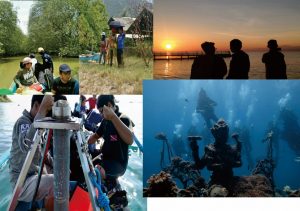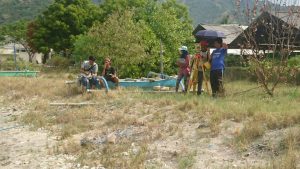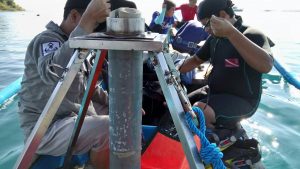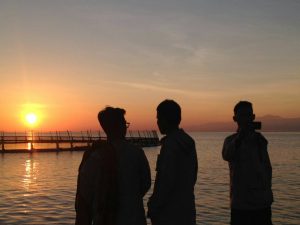Homepage : http://www.oceanography.itb.ac.id/

Indonesia has a strategic geographical condition and also a largest archipelagic country in the world with 62% of sea territorial area that coastal and marine resources an important and beneficial source of foreign exchange for national development. This condition is required human resources who have adequate knowledge and able to contribute to nation’s development of the marine sector. In order to meet the needs of human resources was established Oceanography Study Program Institute Technology Bandung in 1998.
The curriculum of undergraduate program in Oceanography is designed into 8 semesters, 4 years, with 144 semester credit units. Oceanography Study Program accepts students with capacity of 35 students. Input source for Oceanography Study Program is a high school graduate in exact sciences that has a strong foundation in mathematics, physics, and natural sciences.
Scope of Education and Teaching
Oceanography is a science that studied physical processes and dynamics of seawater. Oceanographers dedicate their field of study to marine issues at local, regional and global scale, both pure research and applied studies that can be able to support the study of marine and coastal environments, and support the exploration of marine resources as well as support the development and application of marine engineering and technology.
Oceanography Study Program study the physical and oceanic processes of seawater from theoretical to applied as tidal dynamics studies, ocean currents, ocean waves, ocean-atmosphere interactions, tsunamis, marine ecosystem dynamics, upwelling area prediction of fishing ground, grinding and deposition of coastal sediments to spread of oil spills and other pollutants in the ocean. Study areas reviewed from upstream rivers, estuaries, coastal waters, and offshore waters. The main methods in this science are Field observation, laboratory studies, computer modeling and simulation, and remote sensing applications.
Currently, the area of research development is to support the educational process in Oceanograpy Study Program such as Dynamics of Marine Environment Ecosystems, Alternative Energy from the Ocean, Ocean Disasters and Mitigation, Oceanographic Modeling, Coastal Management, Internal Wave Application and Submarine Acoustics in Military, Ocean Atmospheric Interaction.



Oceanography applications
Utilization and application of oceanography is very wide. Oceanography Study Program has established partnerships with various governmental and private institutions in using of oceanographic studies in Indonesian waters in various fields such as:
(1) management of marine environment for sea water circulation pattern, tidal and sea transport, sea sand mining, and hot waste dissemination around PLTU;
(2) marine engineering such as coastal reclamation, coastline changes, wave fields around coastal buildings, and refraction and wave diffraction;
(3) natural disasters such as early warning systems and tsunami modeling;
(4) ecology and environment such as nitrogen distribution and marine ecosystem dynamics;
(5) fisheries: upwelling area prediction;
(6) marine defense: internal wave and acoustic wave propagation;
(7) atmospheric ocean interactions such as wave climate, El Niño and La Niña, etc.
Infrastructure
Research and education process in the Oceanography Study Program is supported by various facilities and laboratories such as:
1. Coastal Oceanography Laboratory
2. Regional and Theoretical Oceanography Laboratory
3. Services Laboratory: Geoscience Computing
4. Public Library and Web-based Information Network
5. Survey equipment such as tide gauge, aquadopp current profiler, and water quality checker U-10
6. A computer with LAN and Internet



Job Prospect
Graduate students of Oceanography Study Program has the opportunity to take part in the following fields:
(1) education, both in state or private universities;
(2) research, such as Marine and Fishery Research Agency (BRKP) Ministry of Marine Affairs and Fisheries, Center for Oceanographic Research (LIPI), National Aeronautics and Space Agency (LAPAN), Meteorology, Climatology, and Geophysics Agency (BMKG), Hydro Oceanographic Service of the Indonesian National Army of Navy (DISHIDROS TNI AL), Marine Geological Research and Development Center (PPGL), National Nuclear Power Agency (BATAN), Geospatial Information Agency (BIG), Local government (PEMDA), and overseas universities such as Columbia University, USA; Kiel University and Hamburg University, Germany; Tohoku University, Hiroshima University, And Kyoto University, Japan; Utrecht University; TU Delft; WL | Delft Hydraulics; and Twente University, The Netherlands;
(3) offshore oil exploration, for example in Pertamina and Schlumberger;
(4) consultants: in the field of environment and information technology;
(5) foreign and national private survey companies;
(6) and also work in other fields outside Oceanography such as management, journalism, entrepreneurship, etc.
